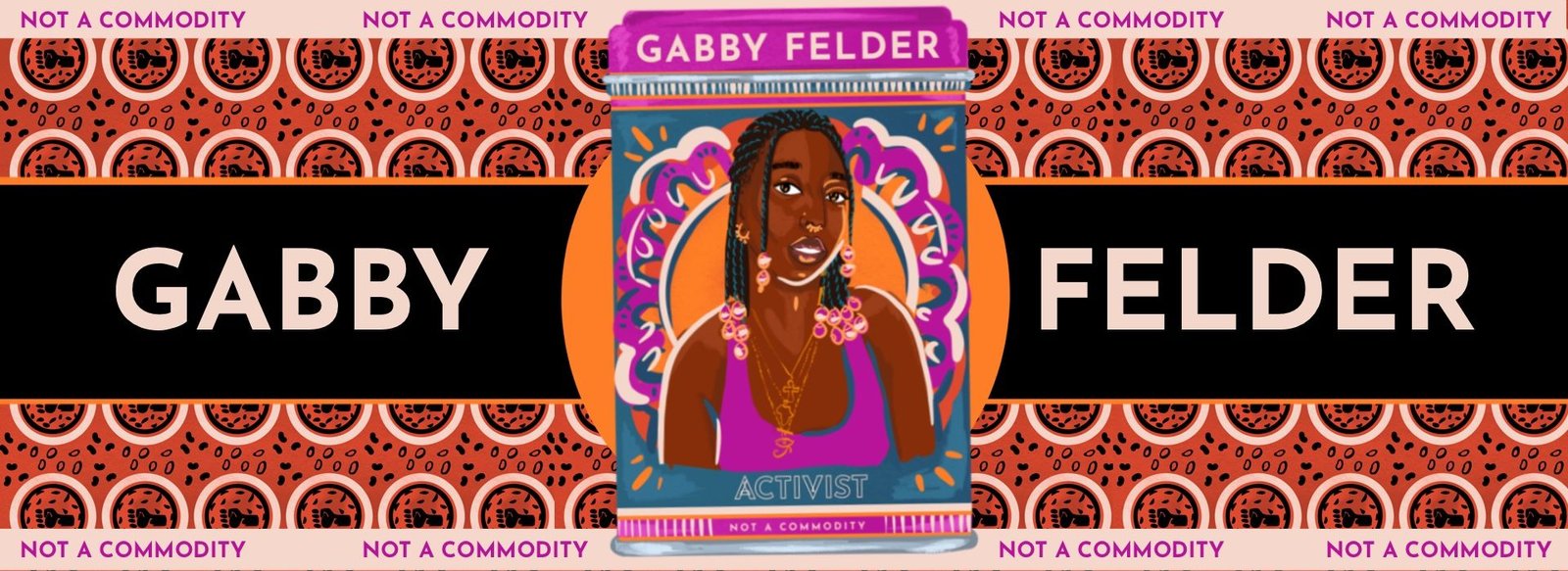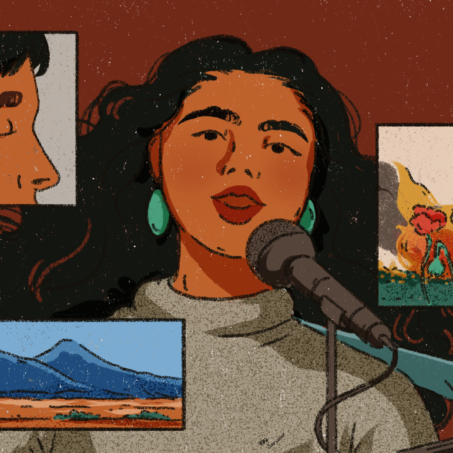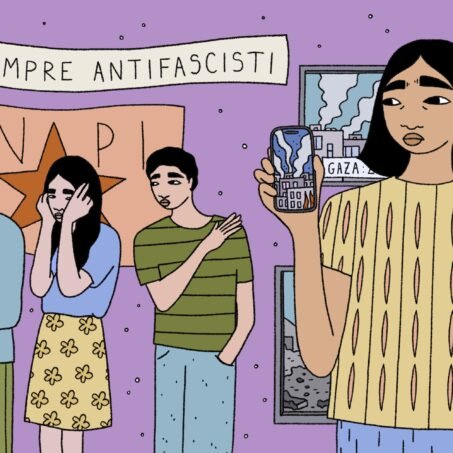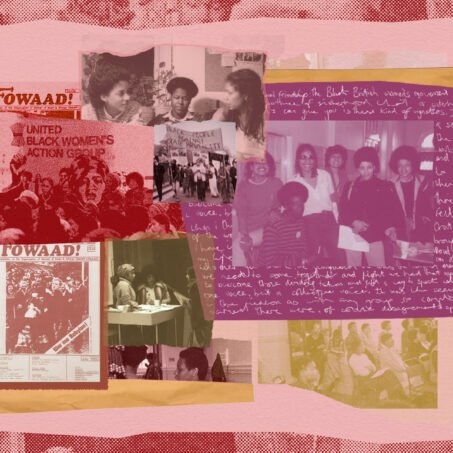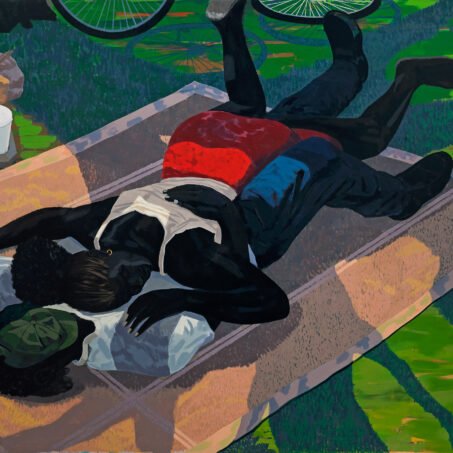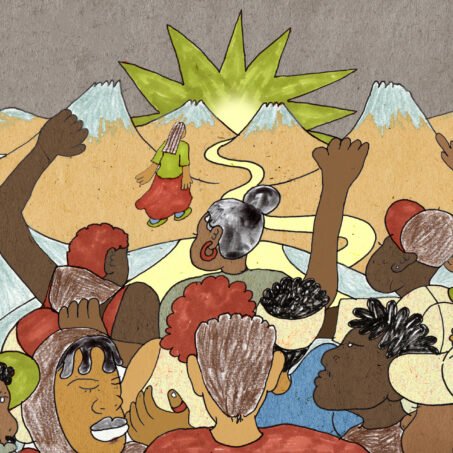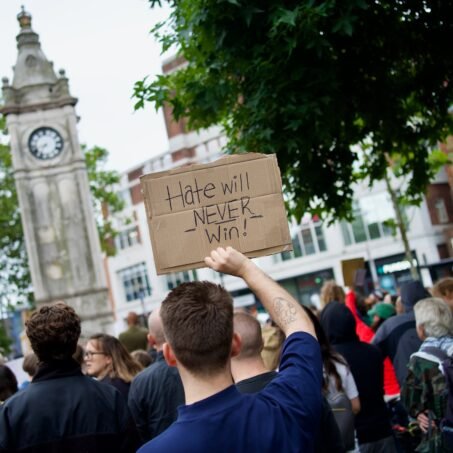“We don’t take seriously the ways in which racism is embedded in structures of institutions. If we assume that there must be an identifiable racist who is the perpetrator, then we won’t ever succeed in eradicating racism.” – Dr. Angela Davis
Throughout American history, Black women like Angela Davis, Assata Shakur and Marsha P. Johnson, have spearheaded movements risking their lives, safety and freedom to cultivate a society where ALL Black lives are valued, especially those of Black women and LGBTQI+ individuals. Today, with socio-political tensions at an all-time high amidst a global pandemic, Black activists like Gabrielle Felder, have taken to social media to continue a fight generations in the making. As an educator, artist and cultural critic, Gabby engages her online followers on issues which have a profound impact on the Black community, most notably racism and white supremacy. On September 23rd, when we sat for what was supposed to be a casual interview about her activism, our moods had been predetermined. History had repeated herself and once again, we were obliged to listen. Exactly 65 years after the murder trial of Emmitt Till ended without convictions, the news broke that the Louisville Police Officers responsible for the slaying of Breonna Taylor would not be convicted. The verdict cast a heavy pall of disappointment over the day and sent ripples throughout the Black community as the message sent was clearly received: Black lives STILL don’t matter.
With each ring of the Zoom call, I mulled over how to address the grief spreading before us . “Hey! Niel? Can you hear me?”. I could hear Gabby. There was air in her voice; the smoke from this dumpster fire could not smother her optimism. This is what we’ve come to expect of Black women; resilience. Compliant endurance, despite being moving targets for a society that prefers them in micro-doses, stereotypes and features, but never in totality. This disappointing reality fuels much of Gabby’s dedication to amplifying Black women voices, while reminding society that Black women do not need nor want its opinions. They only need its support and respect.
Sadness and ego aside, I listened to Gabby as she proclaimed her outrage, disappointment and non-surprise over the Breonna Taylor verdict:
“They don’t care about us! They really don’t give a fuck about us, you know. They basically charged that one guy for the bullets that missed.”
Gabby is no stranger to society’s commodification of Black women’s bodies and the fetishisation of their trauma. Currently, Gabby works as a Prevention Education Specialist at a domestic violence shelter in Portland, Oregon, where she educates the community about topics including consent, healthy relationships, warning signs of abuse, exploitation and sex trafficking. In her experience and based on her knowledge, these are issues that affect Black and Indigenous people substantially more. As such, Gabby’s goal in life is to ensure that Black and Indigenous people have the tools, knowledge and support necessary to succeed in life. Her frustration announced itself in a single sentence:
“They really don’t give a fuck about us.”
The words hit like a fist.
They don’t care about us. Us together, but Black women especially. I could hear the frustration and urgency in her voice, the internalised fear riding waves of inherited exhaustion.
As Gabby spoke, her Californian voice, cool despite the anger and the grief, poured into the room. We sat there, cameras off, no recording. In the Black of our screens and beings, Gabby and I sat, parishioner and priest, as she answered the questions that would follow.
Q: When was the first time you truly saw yourself represented in mainstream media?
GF: “Raven-Symoné. It was interesting because seeing a Black girl on Disney Channel, with Black parents and a younger brother, looked very much like my family dynamic. Her character wasn’t the most popular person, but she was kind of like, cool in school, so people liked her and thought she was cute. I was just like ‘wow, that’s who I wanna be when I grow up. When I’m in high school I wanna be just like Raven Baxter and I wanna live in San Francisco’.
Before that, the TV shows I was watching on Disney Channel were like Lizzie McGuire – and I loved Lizzie McGuire. Great show but, the main character was a blonde girl in a white family. I could relate to her because she had a little brother and so did I, but I didn’t look like Lizzie McGuire. I couldn’t date the boys that Lizzie was dating and I wasn’t interacting with the girls at school the way she was. That’s what was really cool about That’s So Raven; she was dating Black boys in high school and she had friends from a wide variety of backgrounds and they were doing things that looked very similar to my life and what I thought my life would be like in the future. Seeing her on screen was powerful for me and it was different because she was a real person and not a cartoon.”

Q: How’s Gabby the superhero in her own movie?
GF: “I think Gabby is trying to carry on the tradition of the movies that I watched that were really pivotal to me growing up by just being authentically myself… Being the type of activist and academic that I am, I feel it’s my duty to live as my authentic self.
That’s resistance in and of itself; just being who I feel like I really am supposed to be and not trying to water that down.
I feel like for the vast majority of my life I’ve been trying to turn myself into this palatable Black person for the people around me. Growing up, I wanted to whitewash myself as much as possible. In high school and college, I wanted to be the well-spoken Black person and talk about diversity in a way that I knew white people wanted to hear me talk about it. The older I get, the more I realise that you can contort yourself in any way, shape or form you want, but white people aren’t going to necessarily… fuck with you. It’s very much at their discretion and there’s always gonna be something about your appearance or your voice or your hair or your education that’s not up to par for them, so you might as well just do what you want to do and set that example for other Black people.
There have been a couple of times where I’ve been in the grocery store in my hometown – which is predominately white – walking around, and there’s been a little Black girl there. One time, she came up to me and she was like: ‘I just love your hair and I love your earrings’. And I had a big fro and I had these beaded earrings that I got from Kenya and I was like, ‘this is why I do this,’ because I made one Black girl see another Black woman and think: ‘wow, she’s pretty, she looks good; I like seeing her like this’. When you’re young, you’re obviously looking at older girls and women because you’re trying to position yourself. That’s just a natural thing that people do; we look at the people that are older than us and we try to be like them. We want to be like them. I remember being young and being in the mall with my mom and seeing teen girls and being like ‘oh my gosh, their hair is so pretty, I like their earrings – but they were all, not Black.
Q: When was a time that you felt the most free in your life, as a Black woman?
GF: “Earlier this year, like before the pandemic… I was in Jamaica. This was back in March. I’d never been around so many Black people at the same time before; it was my first time out of the country, too. It felt so good to walk into stores and through markets and not have people watching. I mean they could still tell that we were tourists but everyone was just so friendly and happy and FREE. I didn’t know that I could feel like that.”

Join our mailing list
Sign up for shado's picks of the week! Dropping in your inbox every Friday, we share news from inside shado + out, plus job listings, event recommendations and actions ✊
Sign up for shado's picks of the week! Dropping in your inbox every Friday, we share news from inside shado + out, plus job listings, event recommendations and actions ✊
I imagined Gabby blooming in the Jamaican springtime; a lone dandelion in a stranger’s garden, blending in while standing out. She continued to outline the disparities between being Black in the United States versus being Black in Jamaica. Her voice was distant, light with nostalgic recall.
GF: “People can sense that you’re American. I think it’s obviously the way you speak, but it’s also the way you carry yourself or dress, and you have that weird American privilege that in other contexts, feels similar to white privilege, but you’re Black at the same time. I was walking around and people were definitely looking at me, but not in a ‘what is she about to do? Why is she here?’ [way]. It was like ‘oh, she’s a tourist, her outfit is cute’. It felt so bizarre. I was in a store and this dude tried to hit on me and I was like ‘my boyfriend is literally on the other side of the shelf, sir… chill’. But that would’ve never happened to me where I live in the US. There’s no way someone in the grocery store would ever openly say that I was attractive. [In Jamaica], everyone complimented my hair. I felt my most beautiful in Jamaica. My partner noticed it too. My new life goal is to save enough money and move to the Caribbean one day, or West Africa.”
Q: How does your activism translate into everyday life?
GF: “The first thing is, like I said, trying to be as genuinely myself as possible. That includes how I dress. When I have the opportunity, I’m wearing short shorts, I’m wearing crop tops, I’m wearing African print, I’m wearing all of my shirts like – right now I have on a shirt that has Assata Shakur’s face plastered all over it, wearing beads in my hair. I feel like if we spend so much of our lives tiptoeing around, trying not to make people uncomfortable, we’re never gonna be able to tackle racism and classism. Is that what we’re concerned about, making sure that the perpetrators of this violence feel comfortable?
The other thing is reading. I feel like the most important activism I can do is to educate myself. I feel like if I’m going to be a part of a movement, I need to know what I’m mobilising for before I begin mobilising. If I feel like I need to have an understanding of race, not just from my own perspective but globally, [on issues like] critical race theory, political and economical theory, from the great Black writers like James Baldwin, Angela Davis and Assata Shakur. I need to have that understanding to be able to do the sort of digital activism that I do and to be able to articulate these ideas. I need to teach myself so that I can teach others.”
Q: If you could only champion one cause for the rest of your life, what would it be?
GF: “Oh, definitely dismantling white supremacy. Hands down. I’m fascinated by white supremacy for so many reasons. I’m fascinated by it because it impacts my life every single day. I’m fascinated by the sort of mental gymnastics and cognitive dissonance that’s required for white people to continue upholding white supremacy globally and to justify the amount of violence that has been done to people all over the world. I feel like you scratch the surface and the more your read and the more you watch, the layers get deeper and deeper and you start to see the underbelly of everything and it’s so disgusting that your brain is telling you that there’s no way this is true, there’s no way that this actually happened. Then you see the journal entries and you see the pictures from the 1600s and 1700s and you’re like ‘no, this is what literally happened’.
I think that uncovering the mechanisms of white supremacy – understanding how it works, its function, its goal, its connection to economics and capitalism, its connection to a political theory – is so important for everyone, but especially all colonised people – and it is essential for all Black and Indigenous people. It’s essential because that’s the only way we can ever really contextualise our experiences: once we understand how our people got to where we got, and why we were here. The reason why I’m in America is because of capitalism. My family was a product that got shipped here. I’m like an invasive species, essentially, that was carried here on some European boat. When you look at it like that, I feel like it’s a really bizarre emotion to wrestle with, [thinking] ‘yeah, I’m here for the same reason as other commodities’.
It’s bizarre. It’s very bizarre. I think that putting that into the context of everything, [helps you to] better understand your own position in the world. Then, hopefully, it’ll help you shape the future.”
In every generation, great leaders arise; the bold, the inspiring and the revolutionary. As we reached the end of our interview, I got the feeling that this would not be the last I’d hear of Gabrielle Felder. Gabby’s mission is far from complete but perhaps someday, history will immortalize her among the great Black leaders of our time. For now, Gabby’s work serves to educate and empower her local and online communities while underscoring the importance of representation for marginalised groups. Like generations of Black women activists before her, Gabby has become a nurturer, educator and defender within her community while exploring her identity as a woman and activist.
Activism is tricky. It makes your voice bigger than your anxiety, your cause heavier than the fruit it stands to bear and when people see you, they see your work before your worth. That is, if they ever see ‘you’ at all. It’s a magic show based on facts. It’s quick actions and flamboyant flair but, it’s also intrigue, mysticism and a play on what we know to be socially relevant; the acceptable versus the chaotic. You become both a capable magician and lovely assistant; a figurative balancing act that starts with you greeting your audience and ends with you sawing yourself in half, glitter and gore laid out for thunderous applause and sharp scrutiny. How do you engage an audience when the key to their thrill is the tentative torture you may experience without option? Not your hard work, not your expertise, and certainly not your talent, but it is your continued suffering that keeps you relevant.
Seven months after the horrific murder of Breonna Taylor, much of the fiery outrage surrounding white supremacy and systemic racism has cooled. Timelines once inundated with black boxes, prolific paragraphs, and synchronised celebrity serenades, are now a stark caricature of their former uproar. Now, with the fading of media coverage and the steady decline of corporate interest, activists, mostly Black women like Gabby Felder, must walk the tightrope between silent subjugation and ravenous ridicule above a pit of despair and hashtags. They are singing through sorrow, dancing while dying and continuously reminding us that activism is the truest form of suffering for your art.
